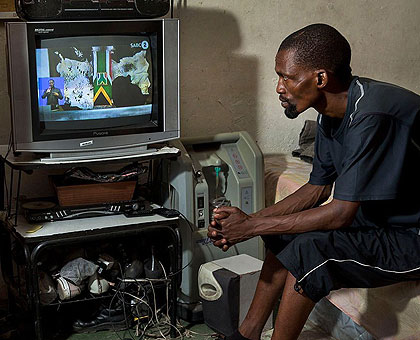Homes with at least one television set are around 8 per cent, while those with at least one computer are as low as two per cent, a new report, the Fourth Rwanda Population and Housing Census, has revealed.


Homes with at least one television set are around 8 per cent, while those with at least one computer are as low as two per cent, a new report, the Fourth Rwanda Population and Housing Census, has revealed.
This will call for additional efforts to increase the number of TV sets, considering that the number of private television stations has gone up.
The reason for this low number, according to analysts, is mainly due to the fact that analogue signals do not reach every corner of the country and thus, people have no reason to buy TV sets.
"The analogue technology only covered 46 per cent of the geographical landscape, meaning that the TV signal did not reach everyone,” Arthur Asiimwe, Director General of Rwanda Broadcasting Agency, said yesterday.
"On the other hand, our digital signal covers up to 95 per cent of Rwanda, thus reaching more people. Certainly, more people will purchase TV sets,” he added.
Asiimwe also highlighted that his agency is in the process to improve the quality of content aired on RBA in order to attract more viewers.
Today, the country boasts several TV stations including Rwanda Television, Family TV, Lemigo TV and TV10.
According to analysts, the increase in internet and cell phone penetration will affect TV viewership in the future.
However, with current statistics showing improved living standards and access to electricity, there is still room for increased ownership of TVs.
Presenting results from the report on Tuesday, Yusuf Murangwa, the Director General of the National Institute of Statistics, said: "Although the government waived taxes on computers, they remain expensive for the majority of private households.”
Most households switch to radios and mobile phones as modes of communication because of their affordability and mobility.
Households with radios and mobile phones account for about 64 per cent and 54 per cent, respectively, as indicated by the report.
"Comparatively, the percentage of households with a radio has more than doubled, from about 27 per cent in 1978 to 64 per cent in 2012,” Murangwa said.
The report further indicates that only 7 per cent of households have access to internet with the common access points being cyber cafes, offices and schools.
According to the report, Rwanda accommodates 2.4 million private households, with 83 per cent located in rural areas. The largest settlement is recorded in the Southern Province and the lowest in Kigali.


